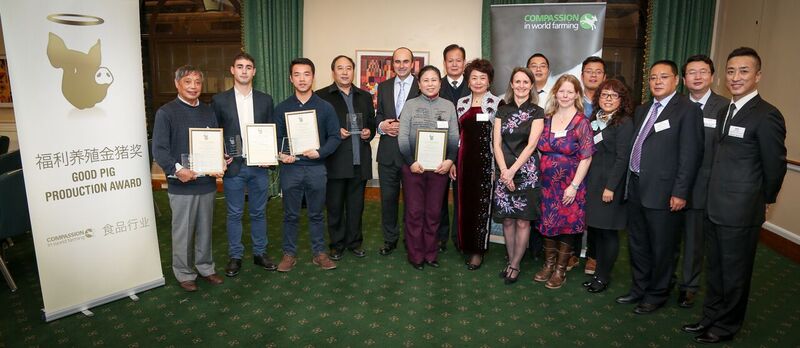



China Making Progress in Welfare in Pig Production
CHINA - More and more pig farmers in China are starting to introduce good welfare and environmental practices in the face of growing intensification.This increasing industrialisation of the pig sector has come about because of the growing population in the country and the increasing demand for more meat and protein as the population becomes more urbanised and wealthier.
However, changes in attitude of the farmers is starting to see growing awareness of animal welfare issues as well as a potential threat to the environment as production changes from small scale pig farms to large scale intensive production.
Such scaling up of production has been achieved by greater vertical integration in the supply chain and a geographic concentration of production, along with the use of highly productive breeds, intensive systems using sow stalls, farrowing crates, high stocking densities and barren pens and intensive practices such as tail docking and teeth clipping.
Understanding of the importance of welfare in the production chain is being nurtured in China by both Compassion in World Farming and the Chinese International Cooperation Committee on Animal Welfare.
And recognition of the success of the changing attitudes to animal welfare were seen last week in Compassion in World Farming’s Good Pig Production Awards, which recognise those farmers that have implemented higher welfare standards.
“The people in China are becoming increasingly aware of the risks of industrial pig production,” said CIWF CEO Philip Lymbery.
“But risks are just another tem for opportunities in waiting.”
He said that the risks that are now being recognised are the risks to the environment such as through pollution, the risks to public health through disease, the risks through poor welfare and the increased use of antibiotics.
He said that by keeping the animals in better conditions the risks are reduced and the need for the use of medicines is also reduced.
“The product becomes a better quality and keeping animals in higher welfare systems makes the product taste better,” said Mr Lymbery.
He said that better quality together with better public awareness provides the opportunity for better animal welfare, which drives trade on.
He said that the CIWF food business programme had placed animal welfare at the heart of the food industry.
However, he said that animal welfare is more than just ensuring the animals are productive, it also includes physical wellbeing, the ability to have behavioural expression and mental wellbeing.
He said that welfare is winning not just for the animals and the farmer, but for the business in general.
The CIWF/ICCAW Good Pig Awards star companies on the level they have reached in implanting good welfare practices.

Madam Xi Chunling, the president of ICCAW said: “Before launching the Good Pig Practice Award, not many people in China were aware of the five freedoms of animal welfare.
“Today industry experts, farm owners and even some consumers know more about pig welfare requirements such as no sow stalls, no teeth clipping, no tail docking and the provision of appropriate bedding materials, all because of the award.
“It is a remarkable change and demonstrates significant progress in China, the world’s largest producer of pigs.
“Moreover, it has resulted in a very positive effect on the global environment and sustainable agricultural development.”
CIWF and ICCAW have worked together with local experts in China to develop welfare codes in the Farm Animal Welfare Requirements for pigs, beef cattle and sheep, with the aim of encouraging best practice and improved animal welfare.
Welfare codes for broilers and laying hens are being developed.
ICCAW has also established supply chain connections in China between producers and retailers for higher welfare pig meat.
Dr Tracey Jones, the director of Food Business at CIWF said that the award aims to stop the use of sow stalls and promote the development of higher welfare systems and practices for both sows and meat pigs.
The farms that receive the awards are audited by ICCAW and CIWF provides technical advice.
Dr Jones said: “Through study tours they accumulate the latest science-based and practical knowledge on pig farming and higher animal welfare production to help cement their own beliefs and encourage them to spread the word in China.”
She added that the awards were helping to ensure better welfare conditions for more than a million pigs in China.
The winners of the awards, which were announced at a ceremony in Church House in Westminster, with several farmers visiting from China, were:
Five star award:
Heilongjiang Dongnong Sanhua Pig Animal Husbandry and Food Co
Laiwu Breeder Pig Farm Co
Hainan Dingan Nabowan Animal Husbandry Co
Yanbian Northeast Local Free-range Pig Development Co
Four star award:
Haerbin Xincheng Yuquanshan Breeding Co
Jianxi Shuosheng Ecological Agriculture Science and Technology Co
Tongjiang Bashan Ecological Animal Husbandry Science and technology Co
Three star award:
Sanmenxia Chuying Agro-Pastoral Co
Neijing Taixinfumin Pig Production Co
Handan Furun Ecological Animal Husbandry Co
Two star award:
Hainan Shengtai Agri Husbandry Co
Changzhou Fenghua Animal Husbandry Co
One star award:
Tianjing Hegtai Livestock Farming Co
Zhong Dao Animal Husbandry Co








